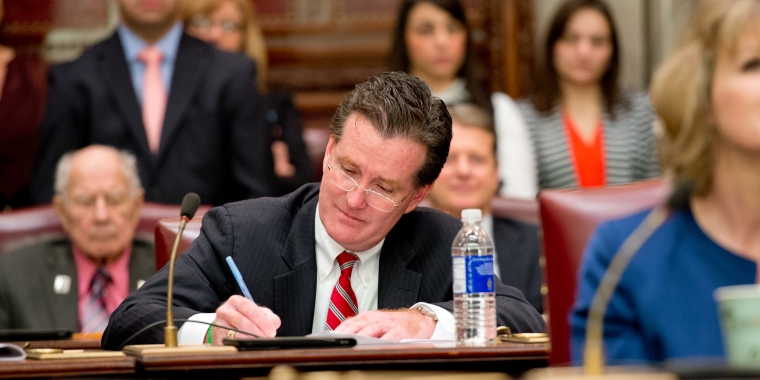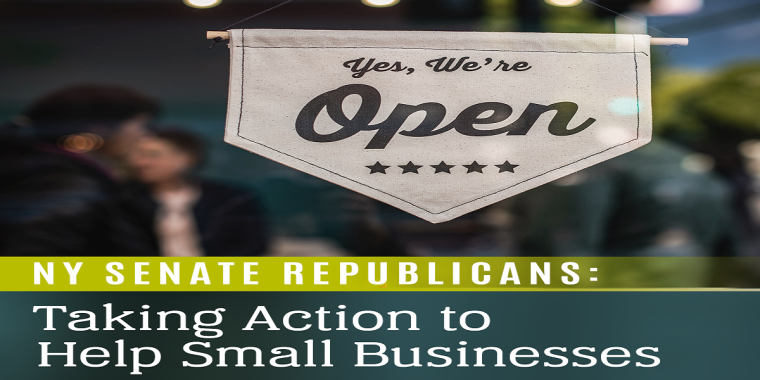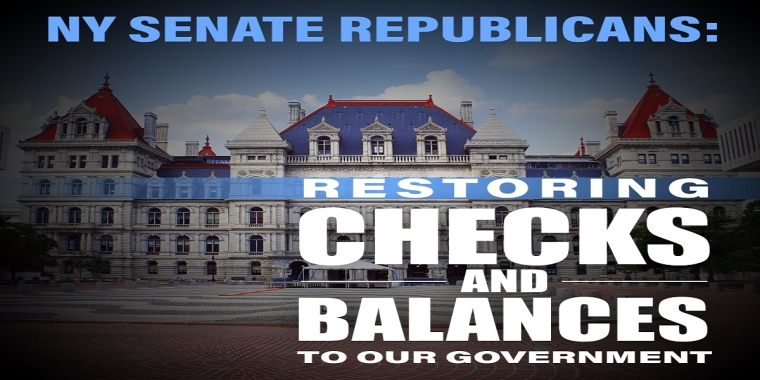
New York State Senate Passes Legislative Package To Save Lives And Stop Drug Dealers From Exploiting Heroin Epidemic
April 30, 2018

Senate Majority Leader John Flanagan announced that the New York State Senate today passed a package of measures that put a necessary focus on strengthening laws to stop drug dealers and others who are profiting from the deadly heroin epidemic that continues to grip the state. The bills passed today include stronger penalties for big-time drug dealers selling heroin, as well as for fraudulent medication prescriptions that fuel opioid addictions; measures to protect dealers from preying on children; and legislation that expands the types of dangerous controlled substances regulated by the state, among others.
Senate Majority Leader Flanagan said, “The Senate has made record investments in heroin and opioid prevention, treatment, and recovery to help those suffering from abuse, and we are committed to continuing to do more on those fronts. But it is past time that the Governor and Assembly recognize the critical role enforcement plays in preventing drugs from entering our communities and stop delaying new laws that would strengthen penalties for serious drug dealers. We have eight weeks left before session concludes, and the Senate Majority intends to make them count by supporting common-sense legislation like today’s package that will make a life-saving difference for New Yorkers.”
The measures stem from extensive input received by New York’s law enforcement community, health professionals, former addicts, and others who have been impacted by the opioid epidemic and participated in the forums and initiatives put forth by the Senate’s Joint Task Force on Heroin and Opioid Addiction, co-chaired by Senator Chris Jacobs, Senator George Amedore, and Senator Fred Akshar.
Senator Jacobs said, “Stiffening penalties for drug dealers and giving law enforcement the tools they need to restrict the flow of illegal substances are critically important elements of our strategic approach to combatting the heroin and opioid epidemic. These measures build upon the record $247 million we fought for in the budget to support treatment and recovery, and they reinforce that our resolve to fight against this public health crisis is as strong as ever.”
Senator Amedore said, “The measures advanced by the Senate today reflect the four-pronged approach the Task Force has advocated: prevention, treatment, recovery and enforcement. This year, we made a record investment to help us tackle this epidemic from every angle, and the package of legislation advanced by the Senate today will not only provide better treatment options, but will ensure our law enforcement officials have the resources necessary to properly punish the big-business drug dealers that are bringing this poison into our communities.”
Senator Akshar said, “This year we were able to secure $247 million in this year's budget to help improve prevention, treatment, recovery and education services across the state. That's $37 million above 2017-18 budget. Now we must focus on enforcement. We need the Governor and the leaders in the Assembly to wake up. We need them to stop playing politics with people's lives and help drive drug dealers out of our communities. Help make access to this poison harder, not easier in our neighborhoods. Our constituents depend on us to show leadership and work together for the benefit of those we represent. If they can't do that, I challenge them to go back to their districts, look their constituents in the eye and tell them they had a chance to do more, but didn't. Instead they sided with the peddlers of poison over our children’s lives.”
Action on these bills builds upon the Senate’s success in getting two new derivatives of fentanyl and several new hallucinogenic drugs, synthetic cannabinoids, and cannabimimetic agents to the state’s controlled substances schedule as part of this year’s budget process. In addition, the budget includes a new record investment of $247 million – $20 million above the 2018-19 Executive Budget proposal, and $37 million above 2017-18 – requested by the Senate’s Task Force for prevention, treatment and recovery. The bills passed today include:
Making it Easier to Prosecute Heroin Dealers:
S638, sponsored by Senator Phil Boyle, assists in the prosecution of heroin dealers by creating a presumption that the possession of 50 or more individual packages containing heroin and/or having an aggregate value of $300 is possession with intent to sell. Currently, dealers can carry large quantities of the drug before triggering a felony charge of possession.
Establishing New Penalties for Heroin Sales:
S880, sponsored by Senator Robert Ortt, creates appropriate-level penalties for heroin sales, taking into account the lighter weight of heroin. Heroin weighs less than other drugs and therefore more doses of heroin are needed to trigger various existing criminal offenses.
Creating Drug Free Zones Around Drug or Alcohol Treatment Centers:
S1127, sponsored by Senator Akshar, criminalizes the sale of a controlled substance on the grounds of a drug or alcohol treatment center, or within 1,000 feet of such facilities. Statistics show that drug dealers often prey on individuals with addictions by sitting in the immediate vicinity of a drug or alcohol treatment center or methadone clinic waiting for people to come out so they can sell them drugs.
Cracking Down on Black Market Prescription Drugs:
S2814, sponsored by Senator Kemp Hannon, establishes the offense of fraudulent prescription, dispensing, and procurement of non-controlled substance prescription medications and devices, and establish the offense of unlawful possession of non-controlled substance prescription medications and devices. The gaps in existing law and the growth of a black market make it self-evident that change is necessary. This bill will address the problem by increasing or establishing criminal penalties that better fit these crimes.
Toughening Penalties for Sale of a Controlled Substance to Minors:
S3845, sponsored by Senator Kathy Marchione, helps curb rising drug abuse among high school students and other youth by making the sale of a controlled substance by an adult to a minor under the age of 14 a class A-II felony.
Cracking Down on The Sale of Carfentanil:
S623, sponsored by Senator Boyle, makes the sale of 2 milligrams or more of Carfentanil a Class A-II felony and the sale of 10 milligrams or more of Carfentanil a Class A-I felony. Carfentanil is synthetic opioid and a schedule II controlled substance, which is 100 times deadlier than fentanyl, and 10,000 times stronger than morphine.
Criminalizing Alpha-PVP / “Flakka”:
S816, sponsored by Senator Rich Funke, designates Alpha-PVP, also known as “Flakka” or “Gravel” as a controlled substance. Similar to bath salts and methamphetamine, use of this designer drug has been known to cause violent behavior, with side effects including nausea, vomiting, paranoia, hallucinations, delusions, suicidal thoughts, seizures, chest pains, and increased blood pressure and heart rate.
Two other bills were recently amended and will be voted upon as soon as they are eligible:
Outlawing Lethal Fentanyl:
S933B, sponsored by Senator Thomas Croci, adds new derivatives of fentanyl to the controlled substance schedule and increases criminal penalties for the sale of an opiate containing a fentanyl derivative. Fentanyl is a strong pain medication that is often combined with anesthesia to prevent surgery-related pain. However, it is increasingly being mixed with heroin and other drugs to produce a cheaper and more lethal product. The other bill, S5884A, sponsored by Senator Jacobs, adds new derivatives of fentanyl to the controlled substance schedule regulated by the state Department of Health.
In addition, the Senate will act on important legislation today to increase prevention, treatment, and recovery as part of the multi-pronged approach to help those impacted by heroin and opioid addiction, including:
Limiting Children’s Opioid Exposure:
S5949, sponsored by Senator Akshar, helps address the increasing risk of children becoming addicted to opioids and heroin after being prescribed painkillers for medical procedures or illegally sharing extra prescriptions. The bill requires a health practitioner to receive written consent from a minor’s parent or legal guardian in order to prescribe a medical treatment containing opioids, as well as to discuss the risks of addiction and dangers of overdose associated with the medication. The bill also limits the prescription for a controlled substance containing an opioid to a seven-day duration unless there is a medical emergency that puts the child’s health or safety at risk.
Expanding Access to Funding for State Substance Abuse Services:
S898A, sponsored by Senator Amedore, authorizes the state Office of Alcoholism and Substance Abuse Services (OASAS) to provide funding to substance use disorder and/or compulsive gambling programs operated by for profit agencies. Current statute states all funds issued by OASAS to provide addiction prevention, treatment, and recovery services must be awarded to non-profit providers. For-profit organizations - which provide similar services - are unable to apply for state contracts through OASAS and such restrictions limits competition within the RFP process that would ensure state dollars are being used in the most efficient way possible.
Coordination of Prescriptions Following an Overdose:
S2639, sponsored by Senator Andrew Lanza, requires hospital and emergency room physicians to notify a patient's prescriber when a patient is being treated for a controlled substance overdose. The measure enhances the effectiveness of the Prescription Monitoring Program (PMP) Registry when prescribing controlled substances by ensuring that vital medical information is shared among health care practitioners. The bill requires an emergency room or hospital practitioner treating a patient with an opioid overdose to consult the PMP registry and notify the patient's prescriber of the overdose. Without such notification of the overdose, it is very possible that the prescriber/practitioner would not know that the patient had suffered an overdose of the opioid.
The Senate also called for action on four bills strengthening enforcement and addressing challenges the opioid epidemic has created that have already passed this session and await action by the Assembly and Governor to become law:
· “Laree’s Law” (S2761), sponsored by Senator Amedore, allows law enforcement officials to charge a drug dealer with homicide if a death results from the sale of heroin or an opiate-controlled substance. This legislation is intended to target mid- to high-level drug dealers who profit from heroin sales, but does not punish co-users by providing a defense for those who bought and used the opiate with the deceased. New York State’s “Good Samaritan Law,” also shields individuals from charges related to an overdose if they attempt to help the individual and report the incident in a timely manner;
· A bill preventing predatory and deceptive substance abuse treatment (S6544), sponsored by Senator Akshar, makes it a crime to offer to or accept any kickback from an individual or entity that provides substance abuse services in exchange for patient referral and admission. There has been a rise in individuals who aggressively pursue people in need of substance use disorder treatment services and, for a sometimes-extravagant fee, promise admission to treatment programs. For individuals engaging in this predatory behavior, the most desirable patients are those with robust insurance coverage, and out-of-network benefit packages. Patient brokers refer these clients to programs offering the highest rate of “return” to the patient broker, with little or no regard for the patient’s specific needs. This predatory practice capitalizes on, and exploits, families’ fears while putting patients at risk of inappropriate treatment;
· The creation of a Sober Living Task Force (S902), sponsored by Senator Croci, would identify and promote alcohol and drug free living environments across the state for persons in recovery from a chemical dependency; and
· The Drug Take Back Act (S7354), sponsored by Senator Hannon and Senator Tom O’Mara, creates a unified, statewide drug take-back program that will save government and taxpayer money and reduce medication misuse. In addition, the program would protect New York State’s water supplies by preventing drugs from being improperly disposed of by flushing or other means that result in contamination of water bodies and negatively impact aquatic life.
The bills were sent to the Assembly.



